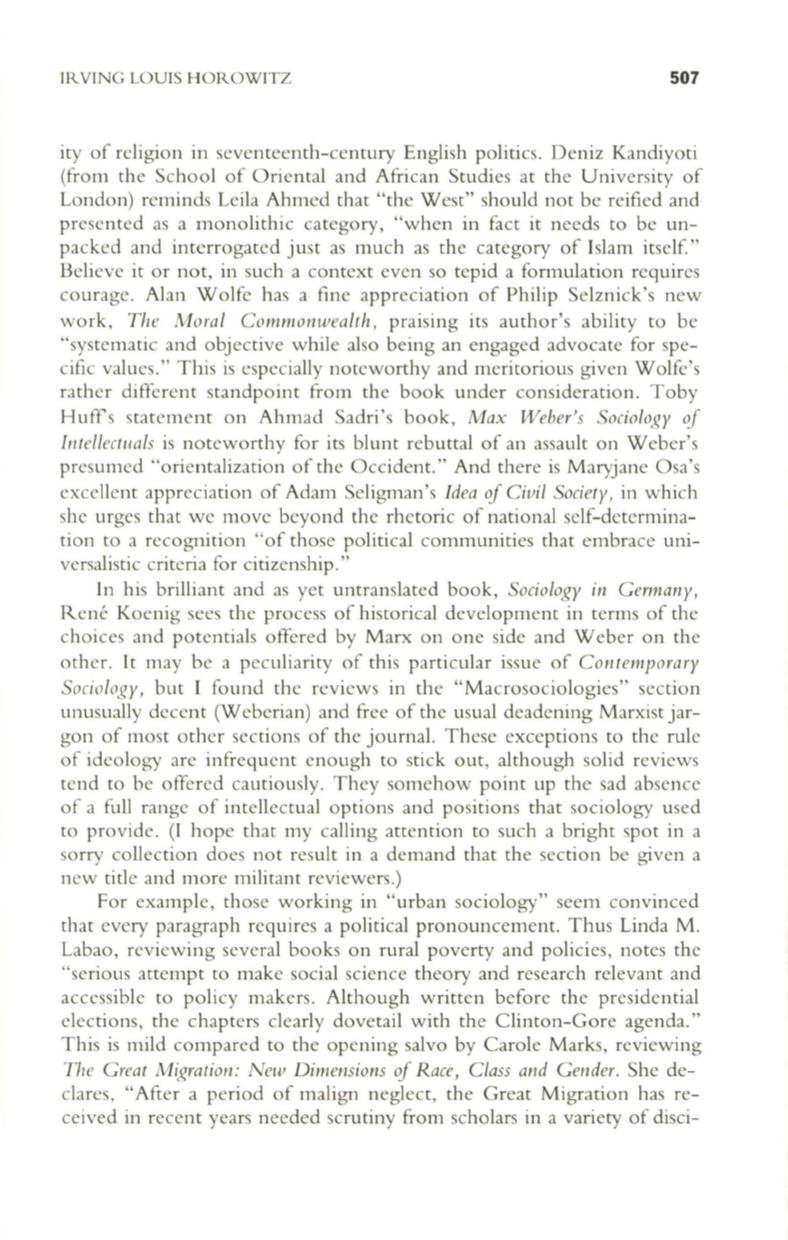
IRVING LOUIS HOROWITZ
507
ity of religion in seventeenth-century English politics. Deniz Kandiyoti
(from the School of Oriental and African Studies at the University of
London) reminds Leila Ahmed that "the West" should not be reified and
presented as a monolithic category, "when in fact it needs to be un–
packed and interrogated just as much as the category of Islam itself."
Believe it or not, in such a context even so tepid a formulation requires
courage. Alan Wolfe has a fine appreciation of Philip Selznick's new
work,
The Moral Commonwealth,
praising its author's ability to be
"systematic and objective while also being an engaged advocate for spe–
cific values." This is especially noteworthy and meritorious given Wolfe's
rather different standpoint from the book under consideration. Toby
Huffs statement on Ahmad Sadri's book,
Max Weber's Sociology oj
Intellectllals
is noteworthy for its blunt rebuttal of an assault on Weber's
presumed "orientalization of the Occident." And there is Maryjane Osa's
excellent appreciation of Adam Seligman's
Idea oj Civil Society,
in which
she urges that we move beyond the rhetoric of national self-determina–
tion to a recognition "of those political communities that embrace uni–
versalistic criteria for citizenship."
In his brilliant and as yet untranslated book,
Sociology in Germany,
Rene Koenig sees the process of historical development in terms of the
choices and potentials offered by Marx on one side and Weber on the
other. It may be a peculiarity of this particular issue of
Contemporary
Sociology,
but I found the reviews in the "Macrosociologies" section
unusually decent (Weberian) and free of the usual deadening Marxist jar–
gon of most other sections of the journal. These exceptions to the rule
of ideology are infrequent enough to stick out, although solid reviews
tend to be offered cautiously. They somehow point up the sad absence
of a full range of intellectual options and positions that sociology used
to provide. (I hope that my calling attention to such a bright spot in a
sorry collection does not result in a demand that the section be given a
new title and more militant reviewers.)
For example, those working in "urban sociology" seem convinced
that every paragraph requires a political pronouncement. Thus Linda M.
Labao, reviewing several books on rural poverty and policies, notes the
"serious attempt to make social science theory and research relevant and
accessible
to
policy makers. Although written before the presidential
elections, the chapters clearly dovetail with the Clinton-Gore agenda."
This is mild compared to the opening salvo by Carole Marks, reviewing
The Great Migration: New Dimensions oj Race, Class and Gender.
She de–
clares, "After a period of malign neglect, the Great Migration has re–
ceived in recent years needed scrutiny from scholars in a variety of disci-


